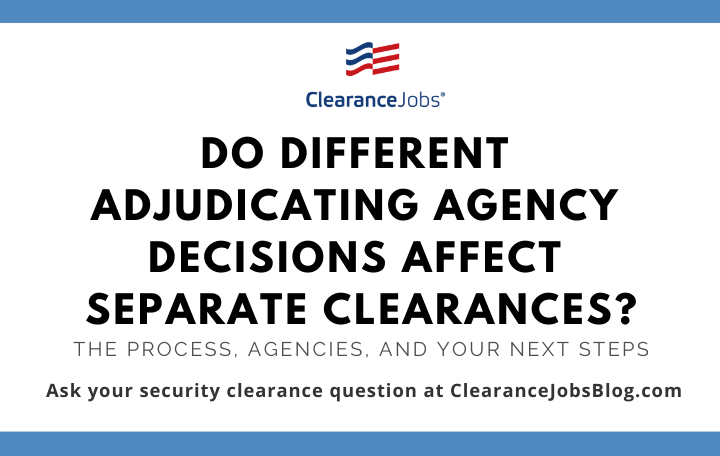A subscriber to the ClearanceJobsBlog – an online forum and discussion site for security officers, background investigators, and security cleared professionals – recently asked an interesting question about the clearance adjudication process between different agencies:
‘I have a friend who is currently a SCI-cleared federal employee in one of the DoD IC elements. He received a COE from a different IC agency and is currently awaiting adjudication with them. If that adjudication for some reason comes back unfavorably, could that impact his current clearance and employment with DoD?’
Let’s say you’re unsure of the different places a security clearance can live (JPAS, Scattered Castles, etc). So first, what does adjudication entail?
THE adjudication PROCESS
The adjudication process, per the DoD Consolidated Adjudications Facility, is managed by trained adjudicators who provide a “whole-person” assessment for the eligible individual. Background investigators apply a set of guidelines to an individual’s personal history and current life situation (think traits such as loyalty, trustworthiness, reliability, and whether it is in the best interest of national security to grant a security clearance).
Sean Bigley wrote about the Department of Defense (DoD) adjudicating clearances for individuals who were not supporting the DoD. Various federal departments and agencies entered an understanding, transferring the authority for their contractor adjudications to DoD and the Defense Office of Hearings and Appeals (DOHA). However, they also retained the authority to adjudicate their employee cases themselves.
adjudicating or sponsoring agencies
Applying for a clearance as a contractor requires your company to inform the sponsoring agency that you require access to classified material. The sponsoring agency (i.e. customer) will consider the request and determine whether to initiate the security clearance process.
Federal agencies have authority to conduct all or some of their own investigations of certain categories of contractor positions. There are 13 guidelines that federal adjudicators use when making security clearance determinations:
(1) Allegiance to the United States; (2) Foreign Influence; (3) Foreign Preference; (4) Sexual Behavior; (5) Personal Conduct; (6) Financial Considerations; (7) Alcohol Consumption; (8) Drug Involvement; (9) Psychological Conditions; (10); Criminal Conduct; (11) Handling Protected Information; (12) Outside Activities; and (13) Use of Information Technology Systems.
So, in short, will an unfavorable response for one clearance adjudication affect your current DoD clearance? It depends. For example, let’s say you passed all the guidelines above during your DoD investigation, yet you have a new reportable issue on the SF-86 you submitted for the new agency. Employees are required to self-report these situations to the security officer responsible for oversight of that office. In this situation, yes, the adjudicator would most likely not grant you an additional security clearance. The derogatory information could then be reported to your current employer, generating an Incident Report that would require an investigation. And while the adjudicative criteria are universal across security clearance, different agencies – and the IC in particular – have their own guidelines for what is acceptable and what isn’t.
Next Steps
Should you find that any adjudicating/sponsoring agency decides to not grant an applicant a security clearance, the individual will move on to the appeals stage, if they so choose. The appeals stage allows for the applicant to petition the decision and potentially be granted a reconsideration for access, ultimately voted on by the Personnel Security Appeals Board (PSAB). Whether you’re denied a clearance by your new agency, or in turn presented with a Statement of Reasons from your current employer, in both cases you have the option to appeal the decision and state your case.
Much about the clearance process resembles the Pirate’s Code: “more what you’d call guidelines than actual rules.” This case-by-case system is meant to consider the whole person, increase process security, and allow the lowest-risk/highest-need candidates to complete the process. However, it also creates a lot of questions for applicants. For this reason, ClearanceJobs maintains ClearanceJobsBlog.com – a forum where clearance seekers can ask the cleared community for advice on their specific security concerns. Ask CJ explores questions posed on the ClearanceJobs Blog forum, emails received, and comments from this site.




